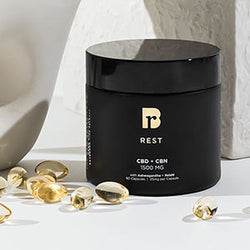CBN (cannabinol) is one of the most promising cannabinoids, although it’s not as well-known as some, like CBD. However, to enjoy the full range of benefits, you’ll need to make an informed decision about the type of product you take. You’ll find CBN (and other cannabinoids) available in several formats.
Three of the most common are capsules, tinctures, and oils. Which is better? What pros and cons do they bring to the table? In this post, we’ll explore CBN capsules, CBN tincture options, and CBN oil to help you make an informed decision about your health and wellness.
What Is Cannabinol?
Before we discuss the various delivery methods out there, let’s talk a little about what cannabinol is in the first place. Usually abbreviated as CBN, it’s similar to CBD and other cannabinoids. However, it also has a few differences. These include:
- The only source of CBN is the cannabis plant. It cannot be sourced from hemp because THC naturally turns into CBN as it ages or when it is exposed to high levels of heat and light.
- CBN is useful for treating many conditions, but is particularly helpful for improving sleep health, and can even help reduce seizures for epileptics.
- CBN is one of the rarest cannabinoids and makes up only a small amount of the total yield from any particular batch. In comparison, CBD makes up 20% to 25%.
The Delivery Systems – Capsules, Tinctures, and Oils
Now that we have a better understanding of what cannabinol is, we should turn our attention to the delivery options. Three common methods are capsules, tinctures, and oils. While all of them work, they are not the same.
CBN Oil
CBN oil is precisely what it sounds like – a carrier oil that is infused with CBN (and usually other cannabinoids, including CBD). Only certain types of oils should be used here, and all are medium-chain triglyceride (MCT) oils. MCT coconut oil is a high-quality choice.
CBN, other cannabinoids, terpenes, and flavonoids are extracted from the plant material through a process called supercritical CO2. This process is superior for its ability to increase the bioavailability of the ingredients within the CBN oil. Next, they’re infused into the oil.
Taking an oil is a simple process. Most are designed to be used sublingually, meaning that you simply apply the specified dose under the tongue and then hold it there for 30 seconds before swallowing. In some cases, oils can also be applied topically and absorbed through the skin. Most of the time, it’s recommended that you take it with food and water.
CBN Tincture
Tinctures differ considerably from oil, although they may include oil as an ingredient. In this situation, alcohol is used to extract cannabinoids, flavonoids, and terpenes instead of supercritical CO2. High-strength alcohol acts as a solvent to pull CBN out of the plant material.
One benefit of this is that alcohol-based formulations have very long shelf lives. Often, they can last up to five years. However, that may come with a bitter taste, which can be alleviated by using a sweetener, vegetable glycerin, or flavoring of some type. Some companies add other ingredients to help better target the product toward the ultimate goal. For instance, adding ashwagandha and lion’s mane can augment CBN’s neuroprotective capabilities.
Taking a tincture involves the same process as taking CBN oil. Simply squeeze the dropper and apply the specified dosage amount under your tongue. Hold it there for 30 seconds and then swallow. Note that while oils can sometimes be applied topically, tinctures cannot. As with oil, a CBN tincture should be taken with food and water.
CBN Capsules
CBN capsules are very similar to both oils and tinctures. It’s only the package that differs. Capsules contain many of the same ingredients as tinctures and oils, including CBN (and usually CBD, and possibly other cannabinoids). They also include the carrier oil (usually MCT coconut oil, at least with reputable manufacturers). Those ingredients are then surrounded by a cellulose (plant-based) capsule that dissolves in your stomach.
The benefit of CBN capsules over oils or tinctures is that there is no need to hold them under your tongue. They are also less messy and far simpler to take. As with tinctures and oils, you should take capsules with food and water, though.
Which Is Better? Understanding the Pros and Cons of CBD Oil, CBD Tincture, and CBD Capsules
Perhaps the most important element of comparison is how the different supplement options perform in the body. Let’s break it down for you.
Oils and Tinctures
Oils and tinctures are designed to allow most of the CBN to be absorbed into the bloodstream under the tongue, which is why you have to hold it there. This ensures very fast absorption into the body. However, both oils and tinctures can be added to food and drinks if you prefer. In this case, you do not benefit from sublingual absorption. Instead, the ingredients will be absorbed through the digestive tract.
CBN Capsules
While both oils and tinctures can be taken sublingually, that’s not the case with capsules. These are designed to be swallowed and then digested. This means that the absorption rate is slower than with sublingual products, but there are benefits to this method that might not be immediately apparent.
For instance, several studies have found that the endocannabinoid system (the system to which CBN binds) is widespread in the digestive tract, where it helps to regulate things like ion transport, motility, cellular proliferation, and more.
Learn More About Our CBN Products
Capsules are simple to take, easy to swallow, and involve no fuss or mess. However, both CBN tincture and oil products offer faster initial absorption into the bloodstream. Which is right for you?
There is no one-size-fits-all solution that will work perfectly for everyone. In addition, it’s important to ensure that you’re buying from a reputable manufacturer that verifies quality and efficacy through third-party testing and sources their products through trusted suppliers. We invite you to learn more about our CBN products, as well as our testing and production processes.







